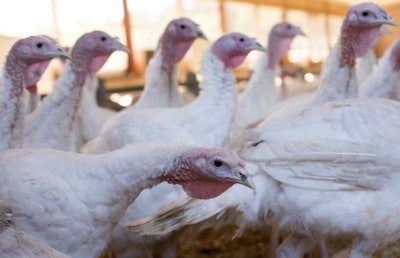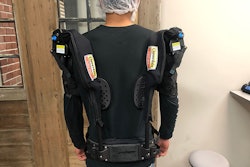
The chairman of the National Turkey Federation said that the U.S. turkey industry has worked hard to navigate the challenges brought on by the COVID-19 pandemic, but added that struggles remain because it is difficult to “change things in a heartbeat.”
Ron Kardel, 2020 NTF, addressed a question about the turkey industry’s ability to adapt to COVID-19-related supply chain challenges, while speaking on November 23 at a ceremony where he and other NTF officials introduced the 2020 presidential turkeys.
Loss of foodservice demand
“COVID has had an impact on every industry, everywhere,” Kardel said. “For us in the turkey industry, the biggest impact was the cutdown – the restrictions on restaurants and foodservice. That created a tremendous disruption in our supply, so that meat did not go to those establishments, so it had to be redirected or rerouted to other food channels.”
Kardel, who is also a grower and vice chairman for West Liberty Foods, saw adjustments being made in his own company.
In May, West Liberty Foods announced that it would adjust its operations to navigate the loss of demand at the restaurant and foodservice level. Because of reduced restaurant dining during the early months of the pandemic, the company accumulated millions of excess pounds of turkey breast meat in cols storage. To be able to “work through that inventory” of turkey meat in cold storage, the company said it would temporarily stop placing poults for an 18-month period, and would furlough workers who worked in evisceration, cut-up, and raw pack at the company’s facility in West Liberty, Iowa.
Thanksgiving demand
The COVID-19 pandemic has not only impacted turkey industry dynamics from the foodservice standpoint, but also for the retail sales of turkey for the Thanksgiving holidays.
“Because of COVID, celebrations for Thanksgiving have changed drastically this year,” said Kardel, noting that for millions of Americans, Thanksgiving celebrations will not be the large family gatherings they are accustomed to. As a result, the demand for larger turkeys are down, and consumers are instead looking for smaller birds or turkey breasts.
But with an inventory of larger birds already in cold storage or growing on the farms, meeting the changing demands has not been easy.
“The industry tried to adapt, but you can’t change things in a heartbeat that were put in a year ago,” Kardel said.
His recommendation to families that haven’t already made their holiday turkey purchase is to go ahead and buy a larger bird, and save and freeze the leftovers.
“We’ll all be staying at home … the leftovers are going to be particularly important to all families,” he said.
View our continuing coverage of the coronavirus/COVID-19 pandemic


















